1968
LSU Vet Med was founded
- and was the 19th veterinary school in the U.S. at the time.
36
students from Louisiana
- made up the first class.
7
deans so far
- in LSU Vet Med history.
Our Deans
Everett D. Besch
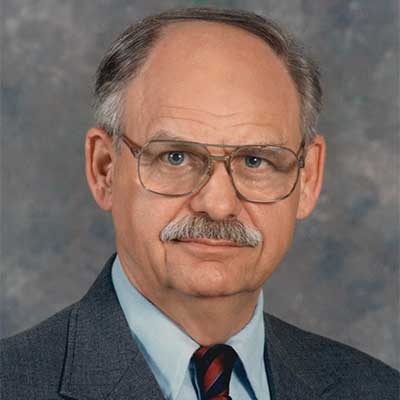
Dean Everett D. Besch was LSU Vet Med's founding dean. He was responsible for recruiting and hiring the original faculty, creating the curriculum, and overseeing LSU Vet Med's original accreditation by the American Veterinary Medical Association. LSU Vet Med was founded in 1968 and accepted its first class in 1973.
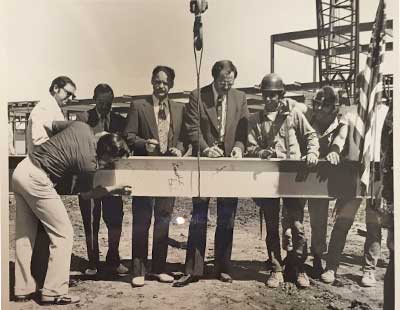
On April 17, 1974, the last beam was placed in the Veterinary Medicine Building. Painted red, white and blue, the beam was signed by (from left to right) Tom Beyt, project architect (standing at left in white coat); Joe Gossen, director, State Board and Building Commission; Dr. Everett D. Besch, dean; David Broussard, project manager and vice president, Eaton Construction Co.; and three steel workers. The person signing the beam is not identified.
"The origin of veterinary medicine occurred when someone of influence and property concluded that the accumulation of domestic animals reflected wealth, that continued annual losses to animal plagues could not longer be tolerated economically, and that the domesticated animal that remained healthy for as long as possible became a more valuable animal. Public acceptance of this concept treated a demand for help dedicated to the care for animals." ~ Dr. Everett D. Besch (1924-2008)
LSU Vet Med was established by the state legislature in 1968. It was in this year that Everett D. Besch, DVM, MPH, PhD, our founding dean, started recruiting core faculty and working on plans for the Veterinary Medicine Building.
Everett D. Besch was born on May 4, 1924, in Hammond, Ind., where he completed elementary and secondary schooling. He lost his father in an accident in 1931 and joined the United States Navy in August 1942. After six years of service, which included 30 months of sea duty (21 months on the minesweeper USS Inaugural AM 242), three battle stars, and 18 months in the reserve fleet, he was discharged from the regular service in August 1948 at Orange, Texas, as a pharmacist mate first class.
In April 1946, he married Mellie Darnell Brockman of Deweyville, Texas. They have five children—four daughters and one son—10 grandchildren, and three great-grandchildren.
He was admitted to the Texas A&M College School of Veterinary Medicine in 1950 in
a class of 44 students—the first class to have completed two years pre-professional
work. After receiving his DVM in 1954, Dr. Besch joined the faculty of the College
of Veterinary Medicine at the University of Minnesota, St. Paul, in the Department
of Veterinary Pathology. For the next two years, he was assigned to the clinical pathology
laboratory in the veterinary teaching hospital, while completing the requirements
for his MPH in the School of
Public Health in 1956.
In August 1956, Dr. Besch joined the faculty of the School of Veterinary Medicine at Oklahoma A&M College as an assistant professor of veterinary parasitology. The college became Oklahoma State University the following year. During his tenure at OSU, he was awarded his PhD in 1963, advanced through academic ranks to professor, and became department head in 1964. During his tenure at OSU, Dr. Besch carried out various research projects involving gastrointestinal parasites of cattle and began studies on selected parasites of companion animals that are of public health importance, primarily the threadworm Strongyloides stercoralis.
Dr. Besch served as a short-time consultant to the Pan American Health Organization and to the World Health Organization traveling to Mexico, Guatemala, the Caribbean, and to Central and South America on different occasions. Additionally, he participated on several advisory panels and review committees of the National Institutes of Health’s Public Health Service; participated in a review of health profession education conducted by the National Academy of Sciences’ National Research Council; served on American Veterinary Medical Association committees; and was elected as an officer in professional organizations, including the Association of American Veterinary Medical Colleges, the American Association of Teachers of Veterinary Public Health and Preventive Medicine, the Conference of Public Health Veterinarians, the American Association of Food Hygiene Veterinarians, and the Animal Disease Research Workers in the Southern States. He was also appointed to the National Advisory Council for Health Profession Education of the Public Health Service, Department of Health, Education, and Welfare.
Dr. Besch had a 12-year tenure as a consultant in veterinary medical education to the U.S. Army Surgeon General serving under three chiefs of veterinary services, Brigadier Generals Elia, Murnane, and Ramsey. In 1976, he was named Veterinarian of the Year by the Louisiana Veterinary Medical Association.
In April 1968, he was appointed as dean of the LSU School of Veterinary Medicine and was charged with the establishment of a program in veterinary medical education for Louisiana. For five years, members of the core faculty were involved with a number of major accomplishments that led to the establishment of the school, including the definition of the program, development of the curriculum and physical plant, obtaining a $10.1 million grant from the NIH to assist in constructing and equipping the Veterinary Medicine Building, and with the recruitment of faculty and staff members. Admission of the first class of 36 students occurred during the 1973-74 academic year.
He was a member of several state and national veterinary associations and research organizations and was a member of the honor societies of Phi Zeta, Phi Kappa Phi, Sigma Xi, and Gamma Sigma Delta. He served on the faculty of two colleges of veterinary medicine—other than the LSU program—that were in the early stages of development, participated in the feasibility study that gave rise to the Caribbean School of Veterinary Medicine, and evaluated the possibility of establishing a school of veterinary medicine associated with St. George’s University on the island of St. Vincent (this program was not approved, though the veterinary program at St. George’s University in Grenada was established in 1999).
One of Dr. Besch’s daughters, Dr. Cynthia Besch-Williford, received her DVM from LSU Vet Med in 1978 and became a faculty member at the University of Missouri-Columbia College of Veterinary Medicine.
Dr. Besch retired from LSU Vet Med in 1988. He was professor emeritus in the Department of Veterinary Microbiology & Parasitology (now the Department of Pathobiological Sciences) and dean emeritus. He maintained an office at LSU Vet Med after retirement and came to the School almost every week until he became too ill to do so. He was an avid historian and contributed articles for the LSU Vet Med magazine for a series entitled, “A Moment in the History of Veterinary Medicine.”
William Jenkins
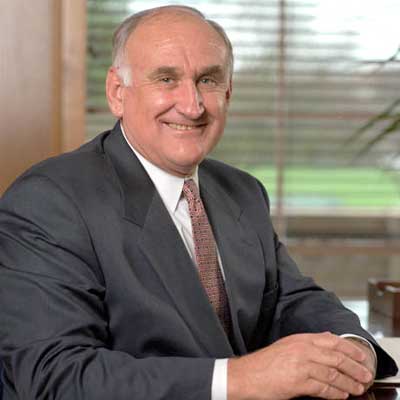
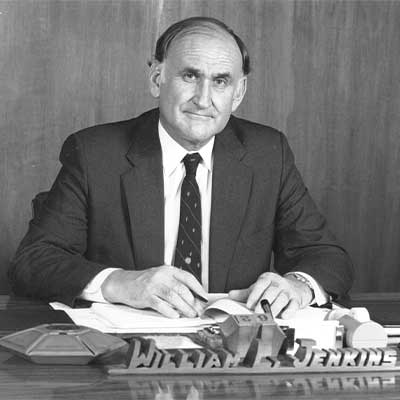
A veterinary scholar, Dr. Jenkins held virtually every major administrative position at LSU, including Provost, Chancellor, and President.
A native of South Africa, William Jenkins, BVSc, M.Med.Vet., PhD, FAVPT, FAAVCT, received his veterinary medicine degree from the University of Pretoria in 1958. He practiced veterinary medicine for four years before joining the faculty at the University of Pretoria, advancing through the ranks to become professor and head of the Department of Veterinary Physiology, Pharmacology, and Toxicology. He obtained specialist credentials in 1968, and in 1970 received a PhD from the University of Missouri in Columbia.
Dr. Jenkins became a member of the faculty in the Department of Veterinary Physiology and Pharmacology at Texas A&M University in 1978. He was appointed dean of the LSU School of Veterinary Medicine in 1988 and was named Provost in 1993. In 1996, he was named Chancellor by the LSU Board of Supervisors. As chancellor, Dr. Jenkins led the strategic reorganization of the main campus administration to make it more efficient and responsive, efforts that were major factors in the later crafting of LSU’s Flagship Agenda.
In 1999, he was named the fourth President of the LSU System, which includes five academic campuses, a law center, state-wide agricultural research and extension services, a leading nutrition research center, two health sciences centers, and ten public hospitals. Jenkins’ tenure as System President was marked by unprecedented growth as well as challenges, including destruction of LSU institutions in New Orleans in the aftermath of hurricanes in the fall of 2005. Although faced with a fiscal crisis and deep budget cuts that disrupted academic programs and forced the furloughs of thousands of LSU employees, Jenkins pressed for calm and reflective responses to the calamities by System and state education officials, actions that led to the rapid reopening of the System’s urban research campus and its health care professional schools in New Orleans. He retired in August 2007, but on February 1, 2008, he assumed duties as Acting Chancellor of Louisiana State University.
As a teacher and administrator, Dr. Jenkins has received numerous teaching and public service awards, among them Communicator of the Year awarded by the Public Relations Association of Louisiana, a Distinguished Alumnus given by the University of Missouri, and the regional chapter of Toastmasters International presented with its Communication and Leadership Award.
Other honors include the Vision of Excellence Award 2000 by the New Orleans Regional Chamber of Commerce and the New Orleans Chapter of MetroVision. In addition, his alma mater, the University of Pretoria, bestowed an Honorary Doctorate on Dr. Jenkins in September 2000. He also was presented with the Volunteer of the Year Award by the Southern Economic Development Conference in 2004.
An active participant in national continuing education efforts, Dr. Jenkins has delivered more than 200 lectures and addresses to diverse groups in both the United States and abroad. The coauthor of a textbook on veterinary pharmacology, he also has taught extensively at both the professional and graduate levels, written more than 60 scientific articles and contributed 15 chapters to various collegiate textbooks.
Dr. Jenkins has been active in numerous professional and civic organizations as well as select national committees. He served on the National Institute of Health’s Alcohol Abuse and Misuse on College Campuses Committee and on a special Steering Committee of the Southern Association of Colleges and Schools that reviewed accreditation criteria for colleges and universities. Dr. Jenkins was also a member of the National Association of State Universities and Land Grant Colleges Committee on Food and Society and is a member of the Governor’s Advisory Commission on Coastal Restoration and Conservation.
In addition, he serves on a number of public boards such as the Louisiana Endowment for the Humanities, The Nature Conservancy of Louisiana, and Teach for America South Louisiana.
Dr. Jenkins and his wife, Peggy, have four children - Sharon, Gwynn, Anthea, and Warren - and ten grandchildren.
David Huxsoll
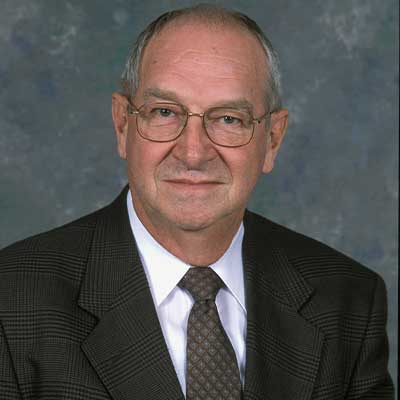
Dean David Huxsoll
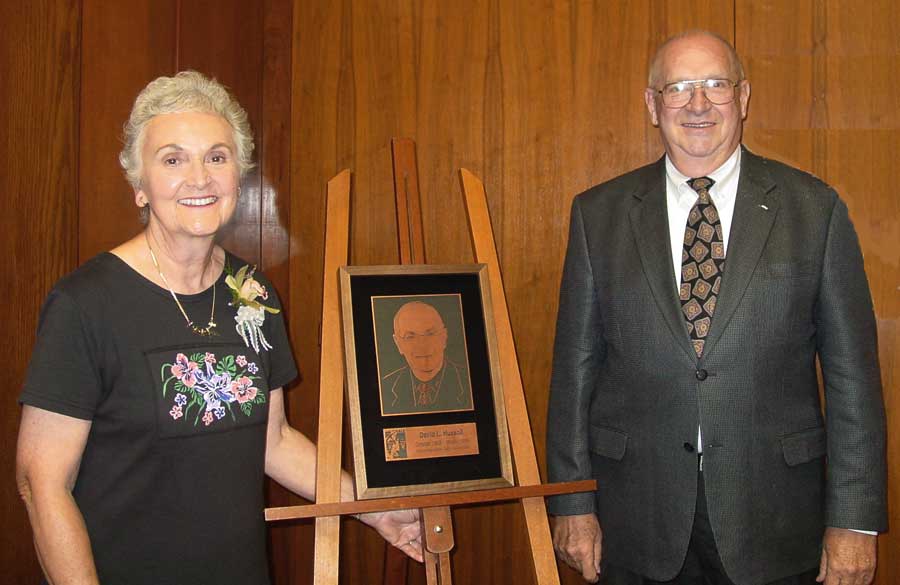
Mr. & Mrs. Huxsoll at Dr. Huxsoll's retirement party.
As Dean of the School of Veterinary Medicine, Dr. Huxsoll was the driving force behind the development of the School’s Cancer Treatment Unit. In addition, Dr. Huxsoll is world-renowned for his expertise in biological warfare and homeland defense.
After completing pre-professional studies at Purdue University, David Huxsoll, DVM, PhD, entered the University of Illinois where he received his DVM degree in 1961. Shortly after graduation, Dr. Huxsoll joined the US Army with an initial assignment at the Walter Reed Army Institute of Research (WRAIR) in Washington, DC. In 1962 Dr. Huxsoll was chosen by the army for long-term civilian training at the University of Notre Dame where he was awarded his PhD in microbiology in 1965.
Before coming to LSU, Dr. Huxsoll had a distinguished, 28-year army career. He served in positions that included Chief, Department of Veterinary Diagnostic Services and Deputy Director of the Division of Veterinary Medicine at the WRAIR; Chief, Department of Veterinary Medicine, 9th Army Medical Laboratory, Vietnam; and Commander of the Army Medical Research Unit in Kuala Lumpur, Malaysia where the research focused on human infectious diseases of military importance in equatorial Asia.
In 1983, following a four-year assignment as Director of the Department of Defense’s infectious disease research program, Dr. Huxsoll became the first veterinarian to command the US Army Medical Research Institute of Infectious Diseases (USAMRIID) at Ft. Detrick, Maryland. At the time, USAMRIID was the largest high-containment infectious disease research laboratory in the “free world.” The mission of the Institute was the medical defense against biological warfare. During his seven-year tenure as commander, the research experienced unprecedented growth, going from $40M in funding to over $75M.
In June 1990, Dr. Huxsoll retired from the army to join the faculty of LSU Vet Med, as Associate Dean for Research and Advanced Studies. He was chosen as the Interim Dean of the School in 1993 and promoted to the position of Dean in 1995. In 1999, Dr. Huxsoll stepped down as dean to pursue his special interest in research on infectious diseases that require special isolation facilities. Serving on an intergovernmental personnel agreement, Dr. Huxsoll was named Director of the US Department of Agriculture’s high-containment research facility on Plum Island, New York, in May of 2000. In this position, he was responsible for research and disease diagnosis designed to protect the U.S. food animal industries and exports against catastrophic economic losses caused by foreign animal disease agents whether accidentally or deliberately introduced. He resigned from this position in June 2004.
Dr. Huxsoll’s achievements are numerous. He is author or co-author of over 100 scientific and professional publications. In the mid-1980’s, Dr. Huxsoll served as the chief technical advisor to the U.S. Department of State during the Geneva-based negotiations of the United Nations biological warfare treaty with the Soviet Union. In addition, Dr. Huxsoll was selected as a member of the first United Nations Special Commission Biological Inspection Team sent to Iraq in Summer 1991 following “Desert Storm,” and served as head of a 13-member United Nations Special Commission Team sent to Iraq in September 1991 to inspect sites suspected of housing biological weapons programs. In September 1994, Dr. Huxsoll again served as Chief Inspector for a United Nations inspection team sent to Iraq.
As Dean of the School of Veterinary Medicine, Dr. Huxsoll was the driving force behind the development of the School’s Cancer Treatment Unit. This Unit has become the foremost veterinary radiation oncology facility in North America and possibly the world. LSU is now the “gold standard” of radiation oncology thanks to the vision and support of Dr. Huxsoll. In addition, Dr. Huxsoll’s expertise in biological warfare and the nation’s concern with homeland defense led to a partnership with the Division of Continuing Education that resulted in millions of dollars for research and research equipment being awarded to the University and LSU Vet Med.
Michael Groves
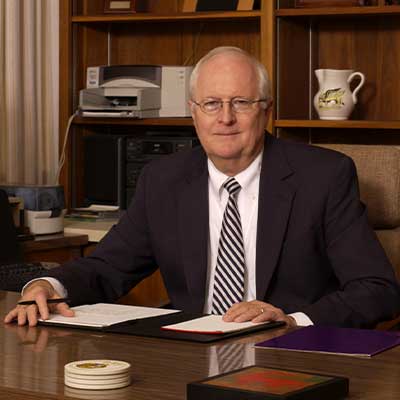
Dean Michael Groves in his office.
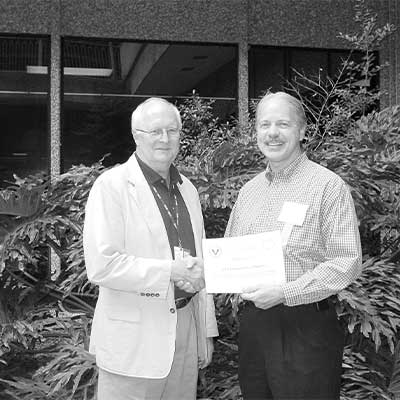
Dean Michael Groves congratulates Dr. Alfred Stevens (LSU 1979), who received the LSU Vet Med Distinguished Alumnus Award in 2004.
Dr. Groves played a central role in guiding research on the protection of deployed military personnel from infectious diseases and on medical defense against biological warfare. Under his direction as dean, LSU Vet Med was reorganized from six departments to three, transitioned to a new DVM curriculum, greatly increased extra-mural research funding and enhanced the research program, increased state funding, received dedicated funding for equine research from slot machine proceeds at racetracks, and came to the aid of animals following Hurricanes Katrina and Rita.
Michael Groves, DVM, MPH, PhD, DACVM, DACVPM, served as dean of the LSU School of Veterinary Medicine from 1999 through 2006. He joined the faculty following his retirement from the U.S. Army, where he served from 1964 to 1990 in the Veterinary Corps.
In the U.S. Army Veterinary Corps, he was active in infectious disease research. His military assignments include five years at the tropical disease research unit in Kuala Lumpur, Malaysia, where he served as commander of the unit from 1989-92; five years as director of the Army/Navy consolidated infectious disease research program; and three years as deputy director of the Walter Reed Army Institute of Research in Washington, D.C. In the latter two positions, Dr. Groves played a central role in guiding research on the protection of deployed military personnel from infectious diseases and on medical defense against biological warfare.
Following his retirement from the army in 1990 as a colonel, he joined the faculty at LSU as the head of the Department of Epidemiology and Community Health. In 1996, Dr. Groves was also appointed as director of the state veterinary diagnostic laboratory. He served as both department head and diagnostic laboratory director until he was appointed dean of the veterinary school in April 1999.
Dr. Groves received his DVM from Texas A&M in 1964 and his MPH from Tulane University Medical School in 1966. He received his PhD in microbiology from the Catholic University of America in 1975. He is a diplomate of the American College of Veterinary Preventive Medicine (ACVPM) and the ACVPM Epidemiology Specialty. He is also a diplomate of the American College of Veterinary Microbiologists. Dr. Groves is a past president of the ACVPM, the Epidemiology Specialty, and the American Association of Food Hygiene Veterinarians. He is also a past chair of the National Board of Veterinary Medical Examiners.
Dr. Groves’s military awards include three Legion of Merit decorations, the Order of Military Medical Merit awarded by the Army Surgeon General, and the James A. McCallum Award for outstanding contributions to military medical research, public health, and veterinary medicine. The ACVPM has honored Dr. Groves with its Distinguished Diplomate Award for significant contributions to veterinary preventive medicine and the Helwig-Jennings Award for outstanding and prolonged service to the college. Dr. Groves has published over 60 scientific articles and book chapters.
Even after he became dean, he continued to teach courses on epidemiology and public health. Under Dr. Groves’s direction as dean (and with help from innumerable faculty and staff), LSU Vet Med was reorganized from six departments to three, transitioned to a new DVM curriculum, greatly increased extra-mural research funding and enhanced the research program, increased state funding, received dedicated funding for equine research from slot machine proceeds at racetracks, and came to the aid of animals following Hurricanes Katrina and Rita.
Upon his retirement from LSU Vet Med in 2006, Dr. Groves was granted the title of Dean Emeritus based upon his distinguished service as department head and dean.
He currently resides in Baton Rouge, Louisiana, with his wife of 42 years, Matilda (Tillie) Groves. Together, they have one daughter, Amy G. Stewart and two granddaughters, Emma and Kate Stewart.
Peter Haynes
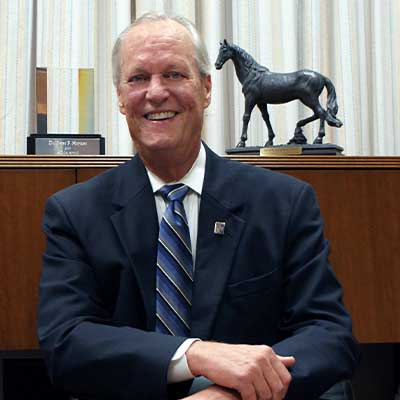
Dr. Peter Haynes in his office.
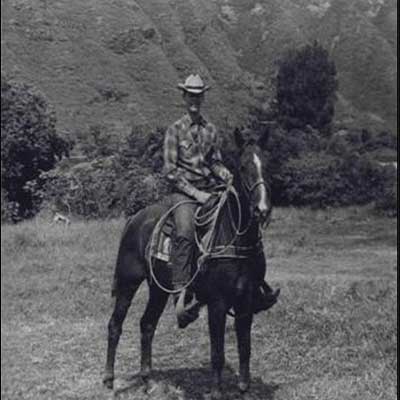
Pete Haynes on a horse in his native Hawaii.
Dr. Haynes held leadership roles in the American Veterinary Medical Association and the American Association of Equine Practitioners, receiving some of their highest honors. He organized the Louisiana Veterinary Medical Association's Equine Committee and seminar, which now bears his name.
Peter F. Haynes, DVM, DACVS, became dean of the LSU School of Veterinary Medicine in June 2007 after serving as interim dean from July 2006. In 2013, Dr. Haynes announced that he will retire at the end of the year.
Dr. Haynes was born in Hawaii in 1944 and came to the “mainland” to attend Colorado State University after graduating from high school in Honolulu. He received a bachelor’s degree in veterinary science in 1967, his DVM in 1969, and his Master’s degree in clinical science in 1974, all from CSU. Following an internship at the University of Minnesota, he began his academic career as a large animal surgery instructor in 1970 at CSU.
Dr. Haynes came to LSU in 1974 as an assistant professor and veterinary clinician in the Veterinary Clinical Sciences department. His clinical and research interests included general equine surgery with a focus on upper respiratory tract obstructive diseases. Dr. Haynes has served in a variety of roles in the Veterinary Teaching Hospital and in administration as associate dean for research from 1994-1999, associate dean of administration from 1999-2000 and executive associate dean from 2000-2006.
In addition to his many academic accomplishments, Dr. Haynes’s résumé reflects a long-standing commitment to organized veterinary medicine and volunteer leadership. He has been a Diplomate of the American College of Veterinary Surgeons since 1977 and has served on numerous committees within that organization. Dr. Haynes is also a member of the American Association of Equine Practitioners and served as president of that organization in 1992. Exceptional contributions he made to the AAEP included driving the strategic planning initiative during a time when the association was in transition and subsequently being engaged in the governance changes of the association, as well as numerous other committee assignments. He was given Distinguished Lifetime Membership in the AAEP in 2001.
Dr. Haynes was a member of the American Veterinary Medical Association since 1969 and served 17 years in the American Veterinary Medical Association House of Delegates starting in 1991. Dr. Haynes was honored in the summer of 2007 for outstanding service as the AAEP’s delegate to the AVMA House of Delegates. In this important role, Dr. Haynes worked to advance the issues that were most vital to equine veterinarians and the care of the horse, as well as the veterinary profession as a whole. He served two terms on the House Advisory Committee, where he developed and implemented the formal meeting of the AVMA’s House of Delegates (HoD) at the Annual Leadership Conference, which subsequently led to its recognition as an official meeting of the HoD. Dr. Haynes also championed the role of the Allied Organizations in the AVMA as a key resource on issues that represented their expertise and commitment (e.g., the AAEP being the recognized voice for the health and welfare of the horse). In addition to his participation in the HoD, he has also served in other capacities for the AVMA, including the Scientific Program Committee, Long Range Planning Committee, and other task forces and committees. In 2008, he received the association’s highest honor, the AVMA Award, which recognizes distinguished contributions to the advancement of veterinary medical organizations.
On a local level, Dr. Haynes co-developed and organized the Louisiana Veterinary Medical Association’s Equine Committee, which has conducted a successful annual LVMA Equine Seminar for more than 35 years. This seminar is now named in his honor. He was named Veterinarian of the Year by the Louisiana Veterinary Medical Association in 1978.
In October 2012, Dr. Haynes received the Colorado State University College of Veterinary Medicine and Biomedical Sciences Distinguished Alumnus Award. Each year, the CSU Alumni Association honors an outstanding alumnus from each of CSU’s eight colleges.
In 2015, he received the honor of Dean Emeritus based on his approximately 40 years of service to LSU, eight years serving as dean of LSU Vet Med.
Dr. Haynes passed away in 2018 in Baton Rouge.
Joel Baines
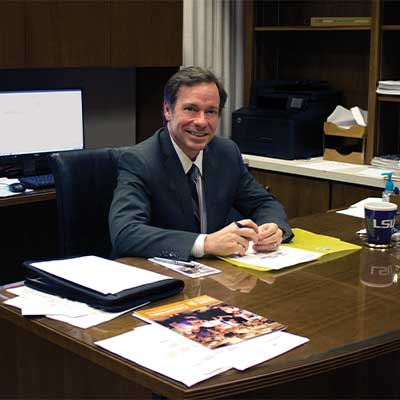
Dr. Joel Baines in his office.
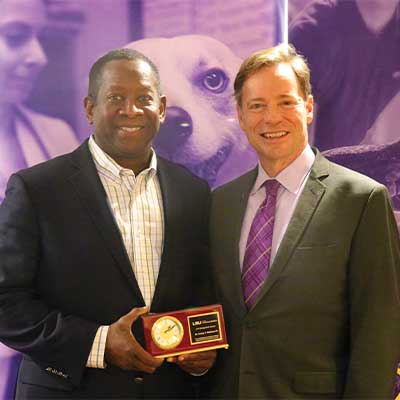
Dr. George Robinson receives the LSU Vet Med Distinguished Alumnus Award from Dr. Baines.
In his role as dean, Dr. Baines worked with the Louisiana Board of Veterinary Medicine to codify faculty licensing and the school's reaccreditation by the American Veterinary Medical Association in 2019. He oversaw the expansion of the DVM class size and the necessary renovation of classrooms and the library. His expertise in coronaviruses was a benefit to both LSU Vet Med and LSU during the pandemic.
Joel D. Baines, VMD, PhD, became dean of LSU Vet Med on September 1, 2014. He came to LSU from the Cornell University College of Veterinary Medicine, where he was the associate dean for research and graduate education and the James Law Professor of Virology. In addition to serving as dean, Dr. Baines also served as the Dr. Kenneth F. Burns Chair in Veterinary Medicine.
He received a bachelor’s degree in microbiology from Kansas State University in 1979 and received a VMD degree from the University of Pennsylvania in 1983. He then received his PhD from Cornell University in 1988, studying the molecular virology of feline coronaviruses. He obtained postdoctoral training at the University of Chicago, studying the molecular virology of herpes simplex virus replication.
Dr. Baines has been funded by the National Institutes of Health since January 1, 1995, to study herpes simplex virus assembly. His research focuses on how capsids are assembled and exit the nuclei of infected cells. These key parts of the viral replication cycle are prime targets for new antiviral drugs.
In his role as dean, Dr. Baines worked with the Louisiana Board of Veterinary Medicine to codify faculty licensing and the school's reaccreditation by the American Veterinary Medical Association in 2019.
He oversaw the expansion of the DVM class size to 120 and the necessary renovation of classrooms and the LSU Vet Med library to accommodate the new students. Lastly, Dr. Baines' expertise in coronaviruses was a benefit to both LSU Vet Med and LSU during the pandemic.
Dr. Baines is on faculty at Cornell University's College of Veterinary Medicine.